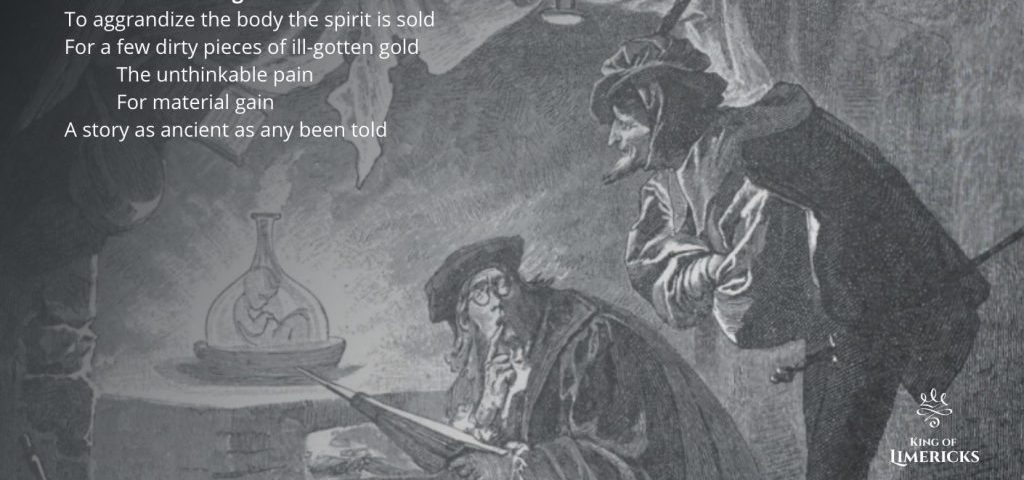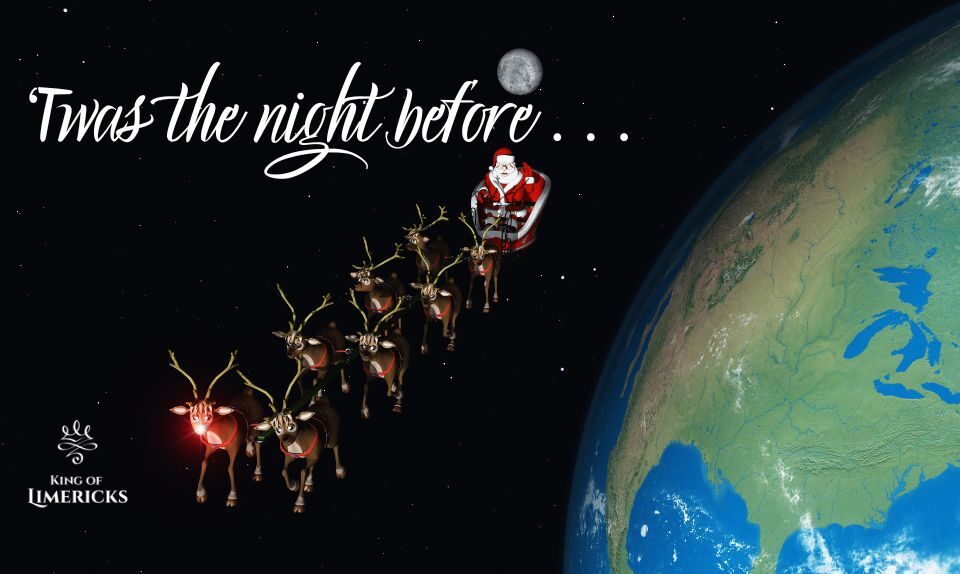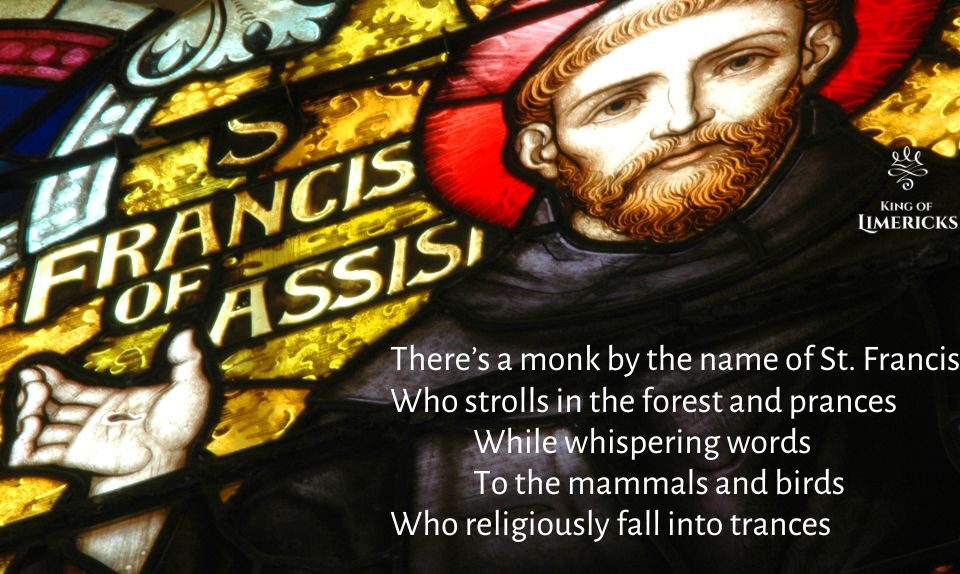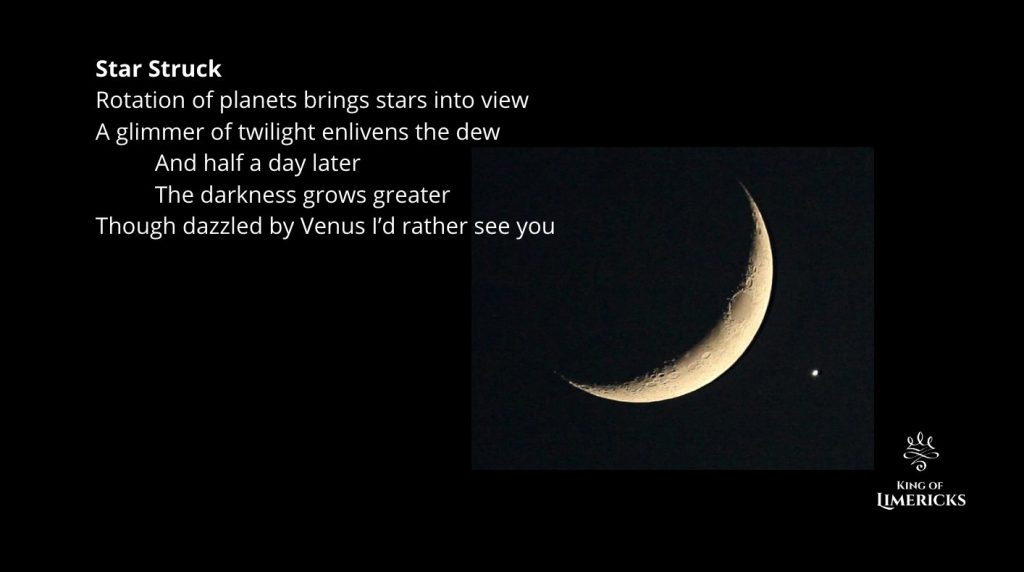
Star-Studded Limericks about Astronomy
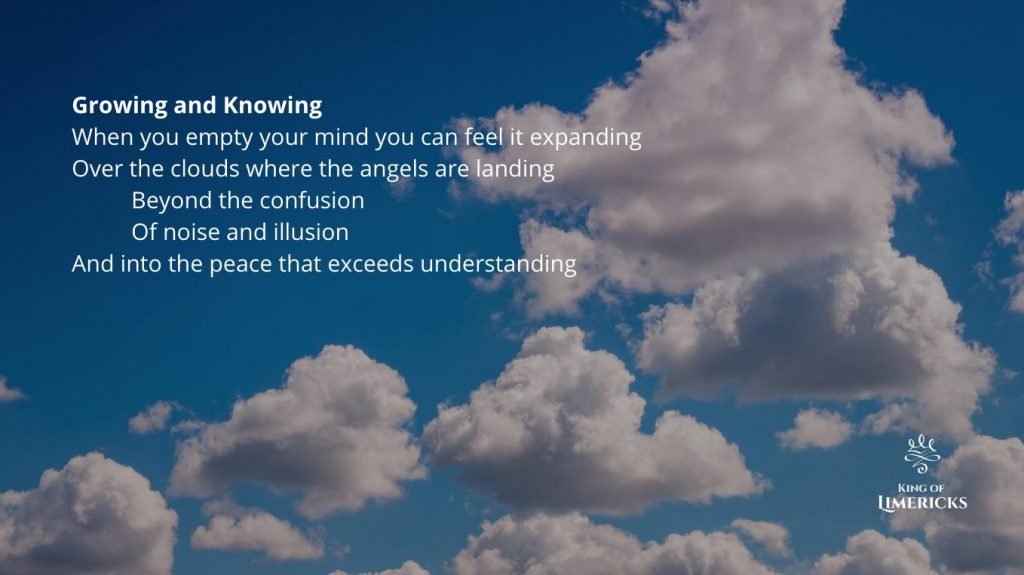
15 Lyrical Limericks about Peace and Harmony
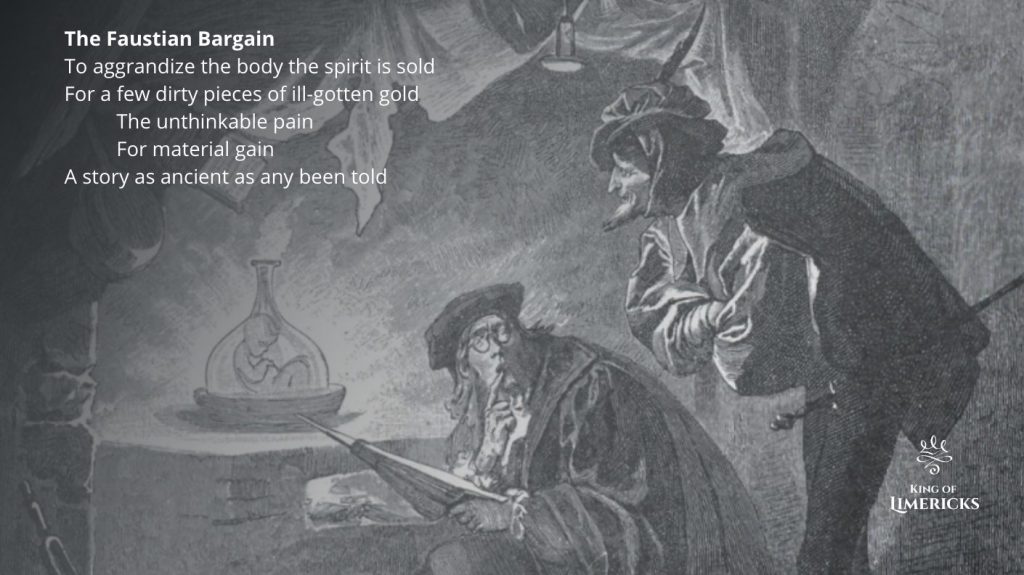
In Germany, he is something like William Shakespeare, Isaac Newton and Benjamin Franklin all rolled into one. But in America, Johann Wolfgang von Goethe (1749-1832) enjoys no such notoriety or celebrity. So why is this quintessential Renaissance man — poet, scholar and scientist — so under appreciated in the English-speaking world? And what can be done to bring Goethe the kind of recognition he so deserves?
The drama and poetry of Goethe speaks to us from another time and another language. But his ideas address the same crisis of faith that our species has be enduring for the last 300 years. Even in the 21st century, his message remains as relevant and profound as ever. So who better than the King of Limericks, and what better time than now, to produce a fresh translation of Goethe. In that spirit, I’m pleased to present a handful of Goethe’s works, now in English, and adapted for the ever-diminishing attention span of the general audience.
A paragon of 18th century Humanism, Goethe’s radical worldview came as something of a reaction to the über-rational levelheadedness of the Enlightenment. His excursions into art and science aimed to illustrate that Reason alone is neither necessary nor sufficient to solve the puzzle of the human condition.
For Goethe, it’s all about embracing every aspect, every high and low of the human experience. Rather than valuing cerebral logic above animal passion, or contrasting righteous virtue against wicked vice, the hard-core humanist honors the entire spectrum of sensations. I try to convey a similar philosophy with my limericks. So the marriage of Goethe and limericks seems only natural.
Goethe’s Faust as a Limerick
Probably Goethe’s best known work, in English at least, is his rendering of the Faust legend. Many consider it to be the greatest piece of literature in the German language.
The accomplished scholar, Dr. Faust, seeks more than ordinary wisdom from life, and the diabolical Mephistopheles appears to him with an irresistible proposal. Mephisto agrees to grant Faust’s every wish, and he bets that he can devise something so satisfying to Faust that he will want to remain in that moment forever. If the demon succeeds, Faust will die in that moment and his soul will belong to Mephisto in Hell.
Based on a traditional legend of uncertain origin, we can easily read the story of Faust as a metaphor about integrity. When life presents us with temptations, it’s up to the individuals to determine their own principles and priorities.
The Faustian Bargain
To aggrandize the body the spirit is sold
For a few dirty pieces of ill-gotten gold
The unthinkable pain
For material gain
A story as ancient as any been told
There, I may have just spared you a few hundred pages of obscure, outdated language. You’re welcome.
Orientations to the divine: Prometheus and Ganymede
The spirit of humanism can clearly trace its lineage back to the classical mythology of ancient Greece and Rome.
In his two complementary poems Prometheus and Ganymede, Goethe calls upon the archetypal patterns of Greek myth to clarify his own message about man’s conflicting tendencies and sensibilities. Indeed, what the ancient Greeks already understood about human nature and were able to illustrate through the drama of mythology cannot possibly be overstated.
Goethe in translation: Mythic limericks
Whereas other works might explore and emphasize the duality of personality traits, such as the rational and the passionate or the civilized and the primeval, this pair of poems from Goethe probes deep into man’s enigmatic relationship with and attitude towards the divine.
Composed in the early 1770s, Prometheus recalls the notorious fire stealer and insolent rabble rouser. Punished by Zeus, he responds to the disapproval of the gods with mutual disdain. According to Goethe, Prometheus instills humans with that same sense of disrespect for authority.
Goethe goes on for several dozen lines, but we can also summarize the poem like so:
Prometheus
This Titan stole fire to share with our race
And that’s when Olympus rescinded its grace
His insolent passion
Delivers a ration
Encouraging humans to step out of place
The Trojan hero Ganymede embodies the opposite attitude and personality. In a life showered with every blessing, he can feel nothing but gratitude and adoration for the gods.
Ganymede
Unwavering acolyte favored by Zeus
Gifted with fortunes and blessings profuse
The boy glowing golden
Is ever beholden
Devotion is all that his heart can produce

Poems of Goethe: With clarity and commentary
Prometheus personifies the spirit of defiance and mischief, stealing fire from the gods to provide mankind with a spark of creativity and ingenuity. So determined was he to share this divine power with humanity, that he was willing to suffer the wrath of Zeus, an interminable punishment, and exposure to the elements. Above all else, Prometheus prizes man for his curiosity and imagination. In Zeus, ruler of Mount Olympus, he sees little more than a spiteful and capricious god who will deny mankind the fire simply out of cruel whimsy, “like the boy who beheads thistles”.
In a world so fraught with evil and anguish, how can anyone accept the notion of divine order and a benevolent, omnipotent ruler? Man can only rely on his own perseverance, endurance and imagination, to make matters more tolerable if he can, and to attribute some meaning to his suffering if he cannot.
And so Prometheus remains undaunted, not to be discouraged by Zeus and his merciless Schadenfreude. “Do you somehow imagine I should hate life, flee to the desert, because not every flowering dream may bloom?” No, instead he presses onward, embracing life with all its sorrows and injustices, indefatigable even in the face of a pitiless master. Not only that, but Prometheus will also see to it that humankind learns to follow his example, to flout divine authority and “to mock you—as I do!”
As a counterpoint to this poetic treatise on misotheism, Goethe gives us the story of Ganymede, with whom Zeus is so smitten that the highest of gods abducts the beautiful young boy; and the boy, showered with love and adoration, succumbs willingly to Zeus’ irresistible seduction. Ganymede embodies obedience and acquiescence, happy to do as he’s told and honor the wishes of his master. In return, the compliant personality experiences life as a smooth ride, and the world a place adorned with welcome mats and doors that swing wide upon, where his gaze is met always with smiles and admiration.
For a golden boy like Ganymede, there is no hostility inherent in his surroundings. The handsome youth smiles, and the world smiles back. He is ever eager to please, and in return the world pleases him. “There calls the nightingale lovingly for me from the misty vale. I come, I come! Whither, ah whither?” What is ordained by the gods shall not be questioned. Ganymede will heed the command and trust that he will never be led towards anything other than the true and the beautiful.
Perhaps it’s his unblemished optimism, his own good attitude and radiant disposition, that produce the wonderful conditions that he continuously finds himself in. He is blessed with a positive outlook, blithe and cooperative, and the circumstances simply conform to his expectations. On the other hand, maybe it’s his unblemished good looks and magnetic charm that bring him so much good fortune, a stroke of good luck and an accident of birth, to be favored with such a charmed life.
Regardless of whether the attitude leads to the circumstances, or the other way around, Ganymede clearly brims with love for the gods and for his own destiny. The idea that any German philosopher could ever relate to Ganymede’s Panglossian optimism is utterly laughable (with the possible exception of Leibniz, who served as the real-life model for Voltaire’s Dr. Pangloss). The legacy of Prometheus, however, is undeniable, as if he were the prototypical existentialist. Like Nietzsche, the bringer of fire subscribes to a morality that goes beyond good and evil; and like Paul Tillich, he acknowledges the unfairness and absurdity of life but boldly maintains the courage to be.
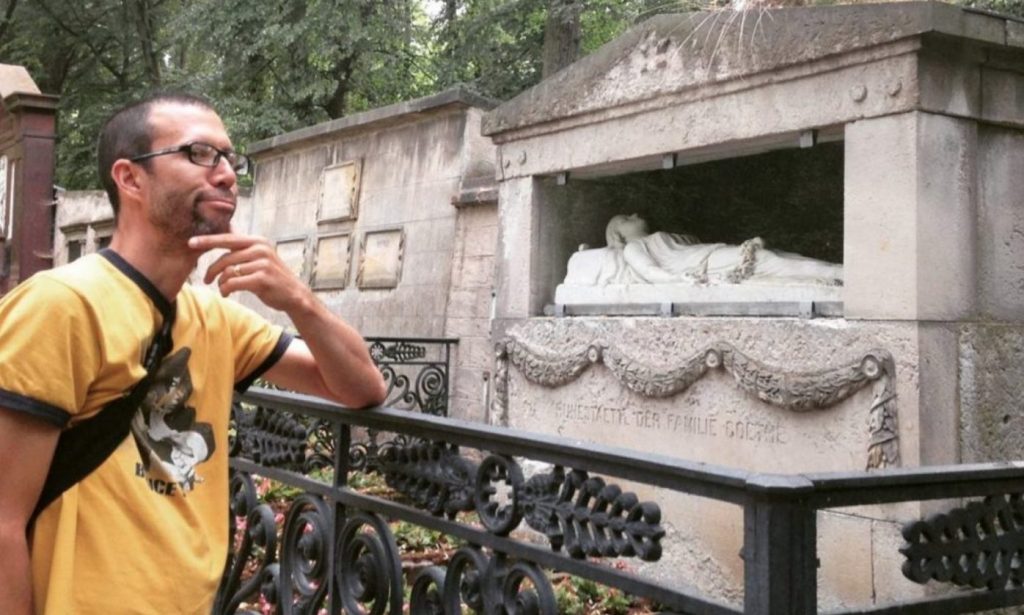
Goethe and the gifts of the gods
Finally, let’s look at one more poem of Goethe’s, another pearl of insight that remains sadly unfamiliar to English-speaking ears. It’s a short and pithy verse, one that perfectly encapsulates the spirit of the humanist paradigm. Again, it’s not about contrasting good feelings and bad feelings, but about celebrating the totality of the human experience.
Alles geben die Götter
Alles geben die Götter, die unendlichen,
Ihren Lieblingen ganz,
Alle Freuden, die unendlichen,
Alle Schmerzen, die unendlichen, ganz.
When I went looking for an English version of the poem, it wasn’t easy to find. So I decided to do my own translation.
The Gods Offer Everything
The gods offer everything, without exception
To their favorites, in entirety
Every pleasure, without exception
Every pain, without exception, entirely
But then it seemed more appropriate, given the nature of this website, to transliterate this jewel of high German Romanticism into a limerick.
Heaven’s Rainbow
The gods will provide every flavor
To the darlings they patently favor
All pleasures obtained
No sorrows ungained
In a spectrum of colors to savor
Further Reading
If you enjoyed these poems, translations and limericks of Goethe, please consider sharing the post or subscribing to the blog. You might also want to check out some of these popular articles:
- Limericks about Inner Wisdom
- Limericks about Dostoyevsky
- Serious Limericks: There once was an unsmiling rhymer

